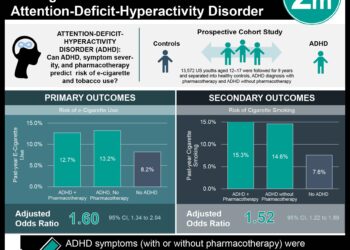African American and Hispanic youth more likely to discontinue ADHD treatment
1. African American youth were less likely to receive adequate follow-up throughout attention-deficit/hyperactivity disorder (ADHD) treatment.
2. Both African American and Hispanic youth were more likely to receive combined treatment, more likely to discontinue medication, and more likely to disengage from treatment when compared to white youth.
Evidence Rating Level: 2 (Good)
Study Rundown: It is well known that Hispanic and African American youth with ADHD have lower rates of medication adherence than white youth, but little is known about the racial/ethnic differences in other dimensions of treatment and care quality among Medicaid-enrolled youth who initiate ADHD medication. This study aimed to elucidate these racial/ethnic differences in the receipt of timely follow-up visits or combined treatment among youth initiating ADHD treatment. Using Medicaid data, results from this study suggest that African American youth were less likely to receive adequate follow-up during treatment than white youth. Hispanic youth were more likely to receive adequate follow-up in the continuation and maintenance (C&M) phase. Both African American and Hispanic were more likely to receive combined treatment, more likely to discontinue medication, and more likely to disengage from treatment. Limitations in this study included the utilization of claim-based measures, which have limited ability to detect clinical need for treatment. In addition, the data did not include information on those for whom Medicaid coverage was discontinued. Overall, the quality of care among Medicaid-enrolled youth initiating ADHD treatment is poor, with treatment disengagement being the most concerning disparity. Future research should focus on understanding the causes for these gaps in quality as this will help create strategies on how address them.
Click to read the study, published today in Pediatrics
Relevant Reading: Prevalence and treatment of mental disorders among US children in the 2001-2004 NHANES
In-Depth [retrospective cohort]: This study included data collected in 9 states and extracted from a Medicaid database during 2008-2011. Performance measure data was extracted via Healthcare Effectiveness Data and Information Systems (HEDIS) criteria where children between the ages of 6 and 12 years were identified with an ADHD diagnosis. The different phases of this study were identified as: (1) Initiation (n = 172 322 children) defined as those who had initiated ADHD medication, (2) Continuation & Maintenance (C&M; n = 157 449 children) defined as those whose continued treatment 270 days after the 30-day initiation phase and (3) a final sample of 62 263 children who had their ADHD prescription filled for at least 210 of the 300 days that spanned the initiation and C&M phases. Adequate follow-up was defined as (1) at least 1 follow-up visit during the 30-day initiation phase and (2) at least 2 additional follow-up visits with a provider during the C&M phase. Treatment disengagement was defined as one of the following: (1) discontinued medication (2) discontinued medication and no psychotherapy visit and (3) discontinued medication with less than 4 psychotherapy visits. Among youth who initiated ADHD medication, 59.3% visited a provider within the first 30 days. Of those who initiated and continued medication, 64.3% received at least 2 additional visits with a provider and 38.2% received combination therapy with psychotherapy. Three-fifths of those who initiated medication did not fill ADHD prescriptions for enough days. Of those who discontinued medication, more than seven-tenths did not receive any psychotherapy visit and more than four-tenths disengaged from treatment. The percentage of African American youth who received any follow up visit in the initiation phase was lower than white youth (55.6% vs 60.5%, p<0.001). In addition, African American children were less likely than white children to receive adequate follow up care in the C&M phase (Marginal Effect* = -2.2%, p<0.01). Hispanic children were more likely to receive adequate follow up care in the initiation phase than white children (62.9% vs. 60.5%, p<0.001) and in the C&M phase (71.0% vs. 63.3%, p<0.001). African American and Hispanic youth were significantly more likely to receive any psychotherapy visit than white youth.
Image: PD
*Marginal Effect is a measure of the instantaneous effect that a change in a particular variable has on the predicted probability when the other covariates are kept fixed.
©2017 2 Minute Medicine, Inc. All rights reserved. No works may be reproduced without expressed written consent from 2 Minute Medicine, Inc. Inquire about licensing here. No article should be construed as medical advice and is not intended as such by the authors or by 2 Minute Medicine, Inc.







